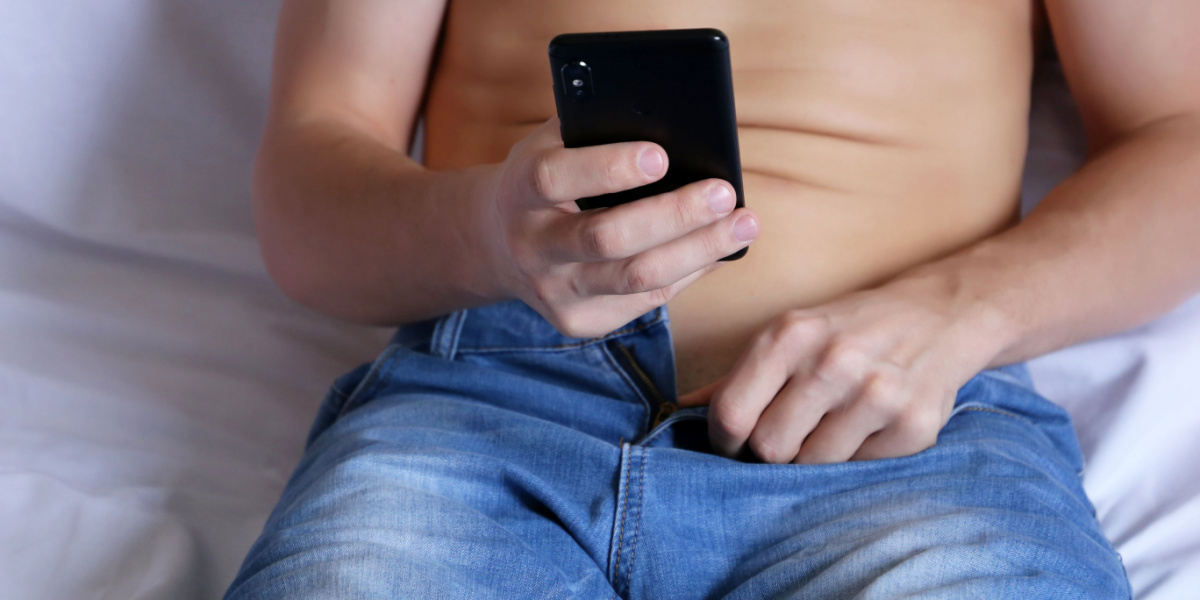Masturbation addiction is a prevalent behavioral addiction with significant negative consequences on individuals’ personal, professional, and romantic lives. This guide analyzes what masturbation addiction is and how it differentiates from porn addiction and hypersexuality disorders. The article also investigates signs of masturbation addiction, withdrawal symptoms, and potential treatment courses.
- Although not a DSM-5-recognized condition, masturbation addiction is a behavioral disorder.
- Excessive porn consumption may accentuate masturbation addiction in people with compulsive sexual disorder.
- Signs of masturbation addiction include the inability to stop regardless of consequences, intense urges, and using masturbation as a coping mechanism.
- Recovery options include identifying underlying causes, psychotherapy, group therapy, and pharmaceutical options.

What is masturbation addiction?
Masturbation addiction is a form of compulsive sexual behavior (CSB), also known as hypersexuality disorder or sexual addiction. CSB is defined by frequent and intense preoccupations with sexual fantasies, urges, and behaviors that become personally distressing, often resulting in impaired social and romantic relations.[1][2]
CSB may involve socially acceptable behaviors called non-paraphilias, such as masturbation and sexual acts with consenting adults, as well as unacceptable behaviors involving non-human or non-consenting persons or objects, called paraphilia.[2]
These manifestations transcend healthy sexual behavior. Masturbation addiction occurs when masturbation becomes a prevalent part of a person’s life, causing severe interpersonal issues, disconnect, intense and uncontrollable urges, or physical symptoms. Left untreated, masturbation addiction may lead to damaged health, career, interpersonal ties, and low self-esteem.[1]
Is masturbation addiction a recognized condition?
Hypersexuality disorder is not a recognized condition according to the fifth and latest edition of the Diagnostic and Statistical Manual of Mental Disorders (DSM-5) published by the American Psychiatric Association. However, the World Health Organization’s International Classification of Diseases 11th Revision (ICD-11) recognizes hypersexuality disorder, and thus, masturbation addiction, as a compulsive sexual behavior (CSB).[3]
In fact, behavioral scientists posit that behavioral addiction is as genuine as substance addiction. In the case of a substance use disorder, alcohol or drugs trigger specific chemicals in the brain, such as norepinephrine and dopamine. These chemicals stimulate pleasure areas in the central nervous system, leading to a feeling of "high." Long-term abuse of such substances is proven to rewire neural activity, causing the individual to become dependent on specific chemicals.[4]
Current literature points out that behavioral addiction, including sexual addiction, video game addiction, eating disorders, or pathological working, may have a similar effect on the brain.[4] Preliminary data indicates that dopaminergic brain activity is one of the factors leading to CSB since dopamine-replacement therapies used for Parkinson’s treatment have been connected with CSB and other impulse-control issues.[5]
Are porn and masturbation addiction the same thing?
Masturbation and porn addiction are not the same, although pornographic materials may be used in masturbation addiction and hypersexuality disorder. Similarly, porn addiction paints solely a facet of masturbation addiction, which may or may not rely on pornographic materials.
However, neuroimaging and neurochemical investigations have shown a potential connection between the use of porn and masturbation addiction. For example, men with CSB have shown a higher activation of certain parts of the brain when presented with pornographic materials, such as in their amygdalas, ventral striatum, and anterior cingulate.[5] These areas of the brain are involved in the neural reward circuitry.[6] Additionally, patients with CSB also show increased activity in brain areas linked to attention and sexual desire when presented with these materials.[5]
In contrast, excessive pornography use in non-CSB individuals is linked to decreased reactivity when shown these materials.[5]
Although apparently contradictory, these findings may prove that masturbation and pornographic addiction follow the same road of dependency as substance addiction. Much as individuals with substance use disorder feel a compulsive urge to continually increase their drug consumption, people with masturbation addiction may need to alter the quality of their pornographic materials, frequency, or place of their self-pleasuring activities to experience the initial high. This is why signs of porn addiction and masturbation addiction are similar.
Signs of masturbation addiction
Masturbation is broadly accepted in the medical community as a normal and natural behavior. This self-pleasuring activity is considered a behavioral disorder when it begins causing problems or is used as a coping mechanism.
One tell-tale sign is an increased frequency of masturbation interrupting or otherwise affecting the individual’s personal and professional life. The heightened urges towards self-pleasuring may elude the individual’s self-control, leading to masturbation in inappropriate or illegal places.[7][8]
Masturbation may also become an unhealthy coping strategy for facing challenging situations. Intense feelings of guilt and shame that accompany the decreased sense of self-control may also signal masturbation or porn addiction.[7][8]
At the interpersonal level, both masturbation and porn addiction may lead to impaired ability to achieve orgasms with a partner due to lower reactivity in the genital and brain areas, whereas physical symptoms include genital injury.[7]
Are there withdrawal symptoms with masturbation addiction?
As masturbation addiction is a type of behavioral addiction, stopping it may be accompanied by withdrawal symptoms similar to those of porn abuse. These symptoms result from breaking the newly-built dopaminergic circuitry in the brain, which is associated with increased feelings of reward.
Learning new coping mechanisms when dealing with challenging situations and expressing healthy sexual behavior with a partner may take time and, thus, may affect people’s patience. The subsequent frustration may deepen the withdrawal symptoms.
These symptoms may include intense cravings to engage in masturbation, feelings of restlessness, anxiety, and mood swings as a result of the brain’s chemical imbalances during the process of quitting.
Additionally, some individuals may experience sleep disturbances, difficulty concentrating, and physical discomfort such as genital pain or soreness when trying to quit compulsive masturbation.
Treatment for masturbation addiction
Masturbation addiction may be treated effectively to help affected individuals re-learn healthy sexual behavior and lead fulfilling lives. Here are some potential courses of treatment:
Treating underlying causes
Treatment for masturbation addiction requires an accurate diagnosis based on identifying the correct causes of the behavior. For example, excessive masturbation and hypersexuality caused by neurodegenerative disorders such as Alzheimer’s Disease or Kleine-Levin Syndrome require treating these conditions first.[1]
Psychotherapy
Conversely, compulsive sexual behavior caused by a history of physical or sexual abuse may require psychotherapy. Psychological treatment, such as psychodynamic and cognitive-behavioral therapy, may help desensitize individuals to specific cues leading to masturbation.[1] Additionally, these forms of treatment have been proven successful in other forms of behavioral addiction, such as eating disorders.
Pharmacological treatment
Pharmacological treatment for masturbation addiction and hypersexuality disorder lacks sufficient data. In a 12-week double-blind study, citalopram, an antidepressant currently used to treat major depressive disorder and obsessive-compulsive disorder, has shown promising results compared to the placebo group.
The 28 male participants showed decreased frequency of masturbation, pornography exposure, and sexual desire.[9] However, this study’s findings have significant limitations due to the low number of participants and short duration.
Another medicine investigated in masturbation addiction treatment is naltrexone, an FDA-approved medicine currently used in the treatment of alcohol and opioid use disorder. In substance use disorder, naltrexone diminishes cravings and the euphoria generated by consuming specific substances.[10]
One long-term study on nineteen patients with CSB highlighted that seventeen of them reported “much improved” and “very much improved” symptoms after using the medicine between 2 months and 2.3 years.[11]
Group therapy
Group therapy may also be an effective treatment by reducing feelings of isolation and shame. However, this treatment is recommended alongside individual and family therapy.[1] Individuals with masturbation addiction require bespoke strategies to tackle their addiction on a case-by-case basis. Couple therapy may also be necessary for compulsive sexual behavior, offering guidance and support to the affected partner.[1]
Support groups such as Sex Addicts Anonymous (SAA) and Sex and Love Addicts Anonymous (SLAA) may likewise complement psychotherapy. These organizations have a twelve-step program similar to that of Alcoholics Anonymous (AA), which has proven effective in treating alcohol use disorder.


-(2)-guide-detail.jpg?v=1722502970)
-guide-detail.jpg?v=1756808944)
-guide-detail.jpg?v=1722502538)